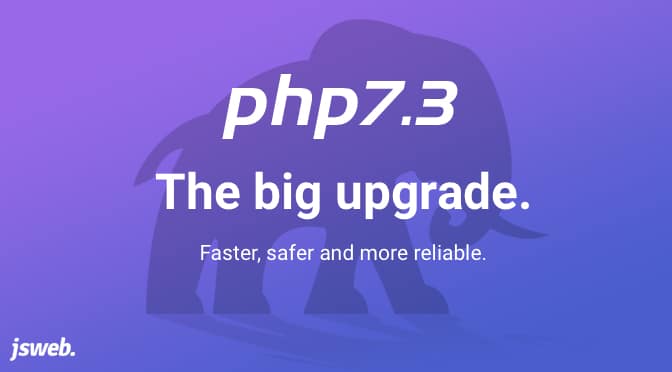JSWeb are committed to providing the latest software on our web servers for optimum performance and security. Part of this job is our technicians maintaining the many different PHP versions on offer. PHP is a server-side scripting language used by approx 75% of all websites.
From time to time we set a new native PHP across our web servers. The native PHP is the default version, which will be used if a specific version has not already been selected. In your cPanel hosting control panel you can select these PHP versions: 5.3, 5.4, 5.5, 5.6, 7.0, 7.1, 7.2, and 7.3
Today we are announcing a date/time when the native PHP will switch to 7.3 and we’re also announcing PHP 7.4 beta for developers who are keen to get their teeth into the latest release!
If you are a website owner, please inform your IT person of this information.
The upgrade has been scheduled: WEDNESDAY 18 DECEMBER 2019 @ 6pm UK time
*This upgrade will effect shared/enterprise/professional hosting plans only. Clients with their own dedicated/virtual servers will be contacted to schedule a separate upgrade date.*
What you should do:
Before the scheduled upgrade, ask your IT person to make sure the website software is up to date and check if it’s compatible with PHP 7.3
If a specific PHP version is required, select it now in your cPanel hosting control panel. You can login via the My Services page on your client area, or ask our team for a reminder of your cPanel login details.
After the scheduled upgrade, you should take time to thoroughly check your website(s) and make sure everything is working normally.
If you encounter a problem, here’s what to do:
- Check every part of your website(s) thoroughly. Make sure the homepage and all sub-pages are loading, including all dynamically generated content.
- If there is a 500 (internal server) error on any part of the website, this could be because you have a custom php.ini file that is no longer compatible. Open the main directory of your website using an FTP program or the cPanel File Manager, find the php.ini file and re-name it to php.ini.old to fix the problem.
- A common cause of a PHP error message is out of date software or plugins, so make sure your website software supports PHP 7.3
- If the website displays a blank white page, this is because PHP has suppressed an error message, saving it to a file called error_log located in the main directory of your website.
- If you need to roll back your web hosting account back to an older PHP version, you can do this in your cPanel control panel using the ‘Select PHP Version’ page. You can select PHP 5.3, 5.4, 5.5, 6.7, 7.0, 7.1, 7.2 or 7.3 on this page. If your website has issues working on PHP 7.3, roll back one version at a time until it’s on the version where it last worked without any issues.
- If your website has a Contact form (or any PHP web script that sends outgoing email), make sure it’s working by submitting a test email. If it’s an e-commerce website, submit a test order.
- When a web script connects to an email server in PHP 5.6, the SSL certificate is validated. This does not happen in PHP 5.5 or earlier. Therefore, the mail server must have a valid SSL certificate. Users connecting to a mail provider with a self-signed certificate will not be able to connect in PHP 5.6 or later.
Our own mail servers all use a valid SSL certificate so there shouldn’t be any problem connecting to them. It might be an issue with other email providers and some clients might need to revert to PHP 5.5. - Importantly, PHP 5.6 and later also check the certificate name matches, which means web scripts must connect to the actual mail server hostname (the server hostname listed in your hosting account signup email) instead of their mail hostname alias (mail.yourdomain.com).
- If you encounter any technical problems, don’t hesitate to get in touch and our team will be happy to assist you. Remember to include your website address, steps on how we can replicate the problem and also any PHP error message that you’ve encountered.
Please allow us the opportunity to fix your website via support ticket. Support tickets and live chats will receive priority over phone calls.
We’re gradually rolling out changes as part of our on-going update schedule where we maintain multiple different PHP versions throughout their lifespan. More information on PHP version lifespan can be found here: https://my.jsweb.uk/knowledgebase.php?action=displayarticle&id=150
Please note two very old versions of PHP will be removed next year. PHP 5.3 and 5.4 have decommissioning dates set in Apr 2020 and Sep 2020. If your website software needs an update, please get in touch with one of our project managers today.
As always, any questions, get in touch!

